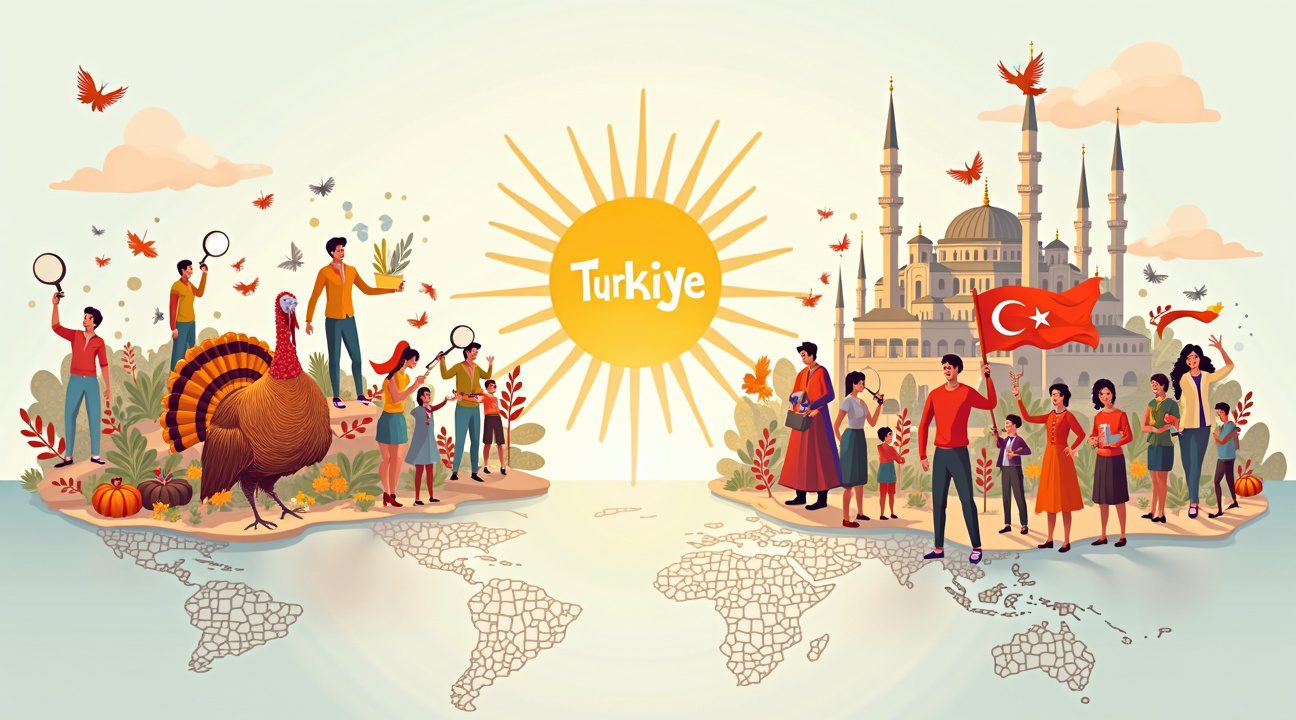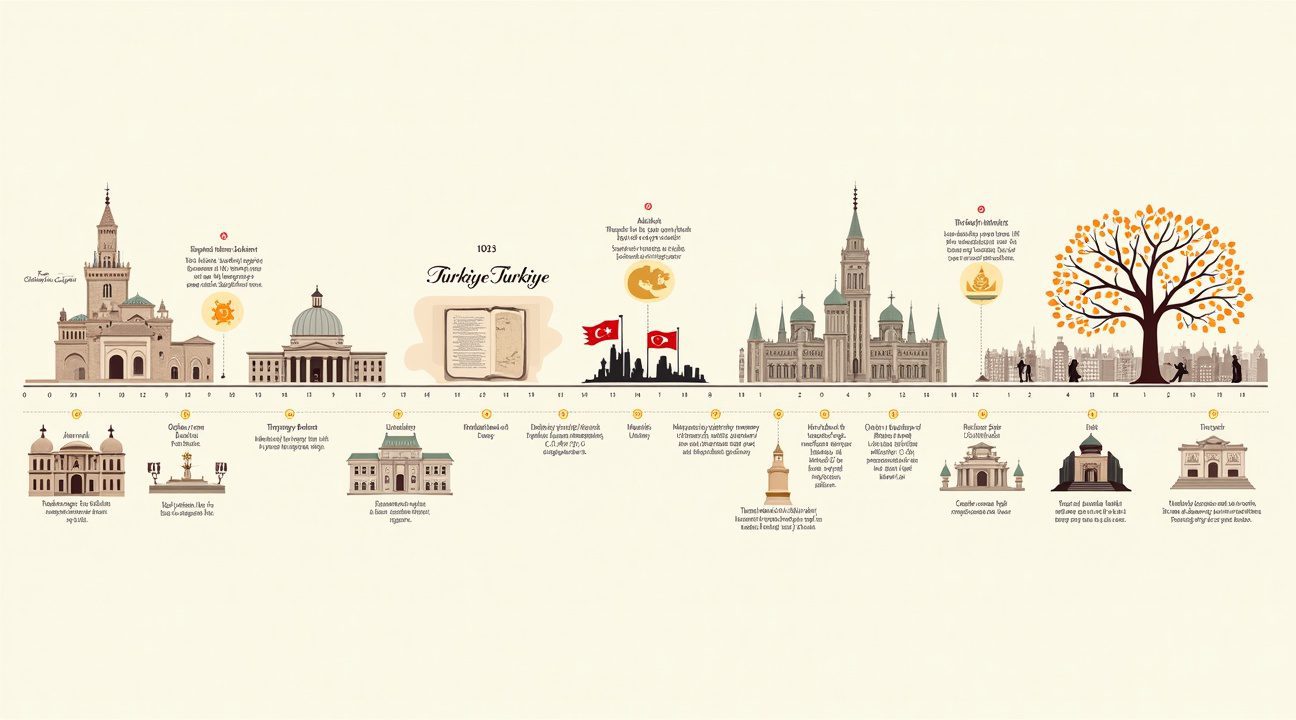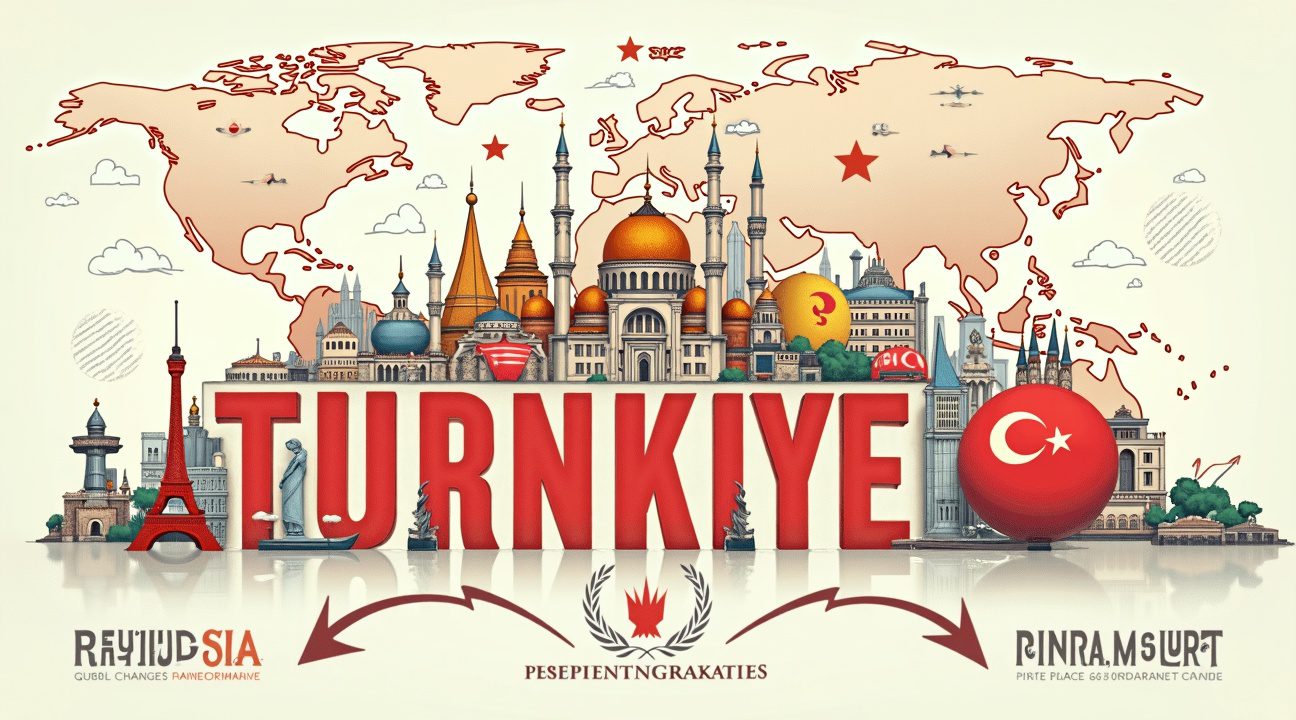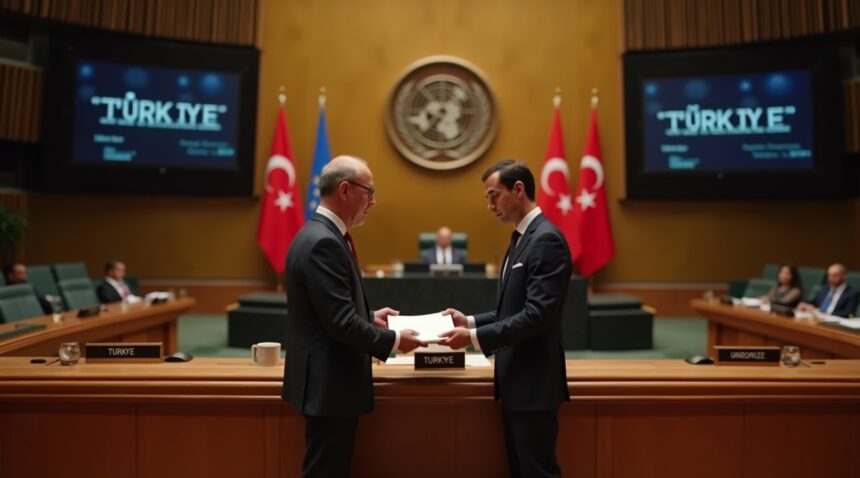Türkiye formally requested international recognition as ‘Türkiye’ in 2022 through diplomatic channels, with Foreign Minister Mevlüt Çavuşoğlu submitting official letters to the United Nations and other major international organizations.
This strategic move aimed to distance the country from negative associations with the English word “turkey” while asserting its authentic cultural identity on the global stage. The effort was supported and quickly approved by major international entities, aligning the international usage of the nation’s name with its long-standing domestic identity.
Key Takeaways
- Türkiye officially requested the name change to ‘Türkiye’ in June 2022, receiving immediate approval from the United Nations and subsequent adoption by international organizations including the U.S. State Department.
- The primary motivation was eliminating negative associations with the English word “turkey,” which refers to both a bird and carries derogatory meanings like failure or worthlessness in English-speaking cultures.
- ‘Türkiye’ has been the country’s official domestic name since 1923, the founding year of the Republic, making this an alignment between domestic and international usage.
- The initiative was launched during President Erdoğan’s administration as both a nationalist branding strategy and a diplomatic effort to enhance Türkiye’s international reputation, particularly in tourism and economic sectors.
- The name change is part of a broader global trend of nations reclaiming authentic cultural designations—examples include Zimbabwe (formerly Rhodesia) and Myanmar (formerly Burma)—although Türkiye’s process was more gradual and diplomatically coordinated.
Turkey Formally Requests International Recognition as Türkiye in 2022
The Republic of Turkey took decisive action in June 2022 by formally requesting international recognition of its preferred name ‘Türkiye’. Foreign Minister Mevlüt Çavuşoğlu submitted an official letter to the United Nations and other major international organizations, marking a pivotal moment in the country’s diplomatic history.
The response from international bodies was swift and accommodating. The United Nations immediately agreed to the change upon receiving the formal request, demonstrating remarkable efficiency in diplomatic protocol. This acceptance set a precedent that other global organizations would soon follow, creating a domino effect across international diplomatic channels.
Following the UN’s lead, the U.S. State Department and various global diplomatic bodies adopted the use of ‘Türkiye’ throughout 2022 and 2023. The State Department’s compliance particularly signaled broad international acceptance of the Turkish Republic’s request. Major European institutions, international trade organizations, and diplomatic missions worldwide began incorporating the new designation into their official communications and documents.
Implementation Timeline and Global Adoption
The transition process revealed both the efficiency of diplomatic machinery and the challenges of widespread adoption. Several key factors influenced the implementation timeline:
- International organizations updated their official records and documentation systems within months of the request
- Diplomatic missions revised their communication protocols and letterheads to reflect the change
- News agencies and media outlets began gradually incorporating ‘Türkiye’ into their style guides and reporting standards
- Educational institutions started updating their curriculum materials and geographical references
- Tourism boards and promotional materials underwent systematic revision to align with the new branding
While the change became official in diplomatic and UN contexts relatively quickly, achieving complete global public usage presents a more complex challenge. Language habits, established media practices, and public awareness all contribute to the gradual nature of this transition.
The Turkish government anticipated that a full transition in global public usage would require years of consistent effort. This realistic timeline acknowledges that changing deeply ingrained linguistic habits and international perceptions takes sustained commitment from both international and domestic stakeholders. Government officials recognized that diplomatic success represented just the first step in a longer journey toward universal adoption.
International adaptation has varied significantly across different sectors and regions. While diplomatic circles embraced the change rapidly, commercial enterprises, educational institutions, and casual public discourse have shown more gradual adoption patterns. The Turkish Republic continues to work with international partners to promote consistent usage of ‘Türkiye’ across all contexts.
The formal recognition by international organizations provided Turkey with the diplomatic foundation necessary to pursue broader cultural and linguistic goals. This success demonstrated how countries can effectively advocate for their preferred international representation when they approach the process through proper diplomatic channels. The precedent set by Turkey’s experience may influence how other nations approach similar requests for nomenclature changes in international affairs.
Domestic adaptation has proceeded alongside international efforts, with Turkish institutions and businesses updating their English-language materials to reflect the preferred spelling. This coordinated approach between domestic and international implementation has strengthened the overall effectiveness of the transition process, ensuring consistency across all official representations of the country’s name.
Why Turkish Officials Wanted to Distance Themselves from the English Word “Turkey”
Turkish officials recognized that the country’s international branding suffered from an unfortunate linguistic coincidence. The English word “turkey” refers not only to their nation but also to a domesticated bird commonly associated with Thanksgiving dinner. Beyond this basic confusion, the word carries negative connotations in English-speaking cultures, where “turkey” can describe something worthless, a failure, or a foolish person.
President Recep Tayyip Erdoğan and his administration viewed this linguistic baggage as a serious impediment to Turkey’s global reputation. I see this as a calculated move to enhance the nation’s standing in international diplomacy, tourism, and economic partnerships. The leadership recognized that potential investors, tourists, and diplomatic partners might unconsciously associate the country with these unflattering meanings, even if such connections occur at a subconscious level.
Strategic National Branding Initiative
The shift to “Türkiye” represents a comprehensive national branding strategy that goes beyond simple name recognition. Turkish officials aimed to increase the country’s brand value by establishing a unique international identity that couldn’t be confused with anything else. This change allows Turkey to control its narrative on the global stage, much like how other countries have successfully rebranded themselves for international audiences.
Officials emphasized that “Türkiye” authentically represents the country’s cultural and linguistic heritage. The name translates to “land of the Turks” and reflects how Turkish citizens have always referred to their homeland. By adopting this authentic designation internationally, Turkey distances itself from Western linguistic associations that don’t align with its cultural identity.
This strategic move also serves tourism and economic interests. When potential visitors search for information about travel destinations, they now encounter “Türkiye” rather than content that might be diluted by references to the bird or negative slang. The distinct spelling helps create a clear separation in search engines and marketing materials, allowing the country to build a more focused digital presence.
The rebranding effort reflects a broader trend among nations seeking to assert their cultural autonomy in an increasingly connected world. Turkish leaders recognized that maintaining an anglicized version of their country’s name inadvertently reinforced colonial-era naming conventions that didn’t serve their contemporary interests. By reclaiming their authentic name, they’ve positioned Turkey to build stronger international relationships based on respect for its genuine cultural identity rather than linguistic convenience for English speakers.

The Name Türkiye Has Actually Been in Use Since 1923
I need to clarify a common misconception about Turkey’s recent international name change. The name “Türkiye” isn’t new at all – it’s been the official designation in the Turkish language since the Republic’s founding nearly a century ago.
A Century of Domestic Usage
Turkish citizens and government institutions have consistently used “Türkiye” in all formal documentation since 1923. The complete official name appears as “Türkiye Cumhuriyeti” (Republic of Turkey) in constitutional texts, legal documents, and diplomatic correspondence within the country. This endonym represents how Turkish people have always referred to their homeland, contrasting with the anglicized “Turkey” that international media and foreign governments adopted.
During the Ottoman Empire period, the region carried different international designations. Foreign powers typically called it the “Ottoman Empire” or simply “Turkey,” while internal Turkish usage already favored variations of “Türkiye.” The empire’s dissolution and subsequent republican transformation brought deliberate linguistic choices that emphasized national sovereignty and cultural identity.
Etymology and National Identity
The etymology of “Türkiye” stems from the autonym “Türk” combined with the Persian suffix “-iye,” literally meaning “land of the Turks.” This construction follows patterns common in Turkic languages and reflects centuries of linguistic evolution. Early republican leaders promoted “Türkiye” as a fundamental element of post-imperial self-definition, distinguishing the new nation from both its Ottoman past and external colonial designations.
Modern Turkey’s recent push for international recognition of “Türkiye” represents alignment between domestic and global usage rather than an actual name change. The country seeks consistency across diplomatic channels, just as media coverage increasingly reflects authentic cultural terminology.
Countries often face similar challenges when their endonyms differ from international conventions:
- Germany calls itself “Deutschland“
- Greece uses “Hellas” internally
Turkey’s situation involves correcting a century-old discrepancy between how citizens identify their country and how the rest of the world addresses it.
The 2022 international campaign simply made official what Turkish speakers have practiced for generations. Government communications now explicitly request that foreign media, diplomatic missions, and international organizations adopt “Türkiye” in all contexts, bringing external recognition in line with established domestic tradition.

How the Two Names Developed Through Different Historical Paths
I find the evolution of these two names fascinating, as they represent completely different linguistic journeys that converged on the same nation. The English term “Turkey” follows a winding path through European languages, starting with Old French “Turquie,” then passing through Medieval Latin “Turchia,” and ultimately tracing back to the Greek “Tουρκία.” Each of these European adaptations was simply a way for outsiders to refer to regions associated with the Turks.
The European Route: From Greek to English
Europeans developed their version of the name through centuries of contact and conflict. Greek speakers first coined “Tουρκία” to describe Turkish territories, and this term gradually morphed as it traveled through different languages. French speakers adapted it to “Turquie,” Latin scholars formalized it as “Turchia,” and eventually English speakers settled on “Turkey.” This progression shows how names can change dramatically as they cross cultural and linguistic boundaries.
The Indigenous Path: From Ancient Inscriptions to Modern Identity
The name “Türkiye” tells a completely different story. I see this as a direct descendant of the autonym “Türk,” which appears in inscriptions dating back to the sixth century. These ancient markings prove that Turkish peoples have been using variations of this name for over 1,400 years. Unlike the European versions that developed through external observation, “Türkiye” grew organically from within Turkish culture and identity.
Pronunciation plays a crucial role in understanding these differences. While many English speakers say “Turkey” exactly like the bird, “Türkiye” sounds quite different—”Tur-kee-yeah.” This distinction matters because it reflects the authentic Turkish pronunciation rather than a foreign adaptation.
The divergence between domestic and international usage became particularly pronounced over time. Within Turkey, “Türkiye” remained central to national identity formation, appearing in official documents, education, and daily conversation. Meanwhile, “Turkey” persisted in international contexts, appearing in media coverage and diplomatic communications worldwide.
This split created an interesting linguistic situation where a country essentially had two different names depending on who was speaking about it. Turkish citizens grew up learning their country’s name as “Türkiye,” while most of the rest of the world knew it as “Turkey.” Each version carries different cultural and historical weight, with “Türkiye” connecting directly to ancient Turkish heritage and “Turkey” representing centuries of European interaction with Turkish territories.
Etymology reveals how names can diverge even when referring to the same place. The Turkish version preserved ancient roots and authentic pronunciation, while the European version transformed through multiple language systems, losing much of its original character along the way.
Political Timing and Nationalist Motivations Behind the Push
The dramatic push for the name change gained momentum in 2021 when President Recep Tayyip Erdoğan issued a presidential circular that specifically urged government agencies to use ‘Türkiye’ in all international communications and diplomatic correspondence. This directive represented more than a simple administrative change—it signaled a calculated political strategy emerging during a particularly challenging period for the country.
Strategic Timing Amid Domestic Challenges
Political observers consistently point to the timing of this initiative, which coincided with mounting economic difficulties and increasing political polarization within the country. The Turkish economy faced significant headwinds in 2021, including currency volatility and inflation pressures that created substantial domestic challenges for the government. I find it remarkable how political leaders often deploy symbolic initiatives during periods of economic uncertainty to redirect public attention and strengthen national unity.
Analysts interpret this name change campaign as serving dual purposes: reinforcing domestic nationalist sentiment while simultaneously attempting to reshape international perceptions of the country. The initiative arrived at a time when Erdoğan’s administration faced critical elections on the horizon, making the strengthening of national identity particularly valuable for domestic political purposes.
Nationalism Meets International Diplomacy
The strategy functions at the fascinating intersection of diplomacy, politics, and modern branding techniques. Erdoğan’s government framed the change as reclaiming authentic Turkish identity from foreign linguistic interpretations that had persisted for decades. This nationalist narrative resonated with supporters who viewed the move as asserting sovereignty over how the country presents itself globally.
UN recognition of the name change became a key diplomatic victory for the administration. The successful lobbying effort at international organizations demonstrated the government’s ability to execute complex diplomatic initiatives while managing domestic political pressures. Foreign ministry officials worked systematically to ensure that international bodies, embassies, and multinational organizations adopted the new designation in their official documentation.
The branding aspect cannot be understated in this context. Government communications emphasized how ‘Türkiye’ would help distinguish the country from:
- Negative associations with the bird
- Failed initiatives or stereotypes
This branding effort was also positioned to potentially improve:
- Tourism prospects
- International investment appeal
This marketing dimension shows how modern political leadership increasingly thinks about national identity through commercial lenses.
Political polarization within the country influenced how different segments of society received this initiative. Erdoğan’s supporters embraced the change as a patriotic assertion of Turkish values and independence from Western linguistic conventions. Opposition groups, however, often viewed the effort as a distraction from more pressing economic concerns affecting ordinary citizens’ daily lives.
The international diplomacy component required sustained effort across multiple channels. Turkish embassies worldwide received instructions to promote the new name in their host countries, while trade organizations and cultural institutions began incorporating ‘Türkiye’ into their communications. This systematic approach mirrors how major cultural figures manage their public image across different platforms and audiences.
Economic crisis management often involves symbolic gestures alongside practical policy measures. The name change initiative provided the government with a positive narrative during challenging economic times, offering citizens a sense of national achievement even as they grappled with inflation and currency concerns. This psychological dimension of political leadership demonstrates how symbolic victories can complement material policy approaches.
The intersection of nationalism, diplomacy, and politics in this name change effort reveals how contemporary governments navigate complex domestic and international pressures. Erdoğan’s administration successfully transformed what could have been viewed as a minor administrative adjustment into a significant assertion of national sovereignty and cultural identity, achieving tangible diplomatic results while strengthening domestic political positioning.

Drawing Comparisons to Similar International Name Changes
Turkey’s transformation to Türkiye follows a well-established pattern of nations reclaiming their identity through official name changes. Countries throughout history have pursued similar paths, often driven by desires to assert independence, shed colonial legacies, or strengthen cultural authenticity.
Zimbabwe’s evolution from Rhodesia represents one of the most significant examples of post-colonial rebranding. The country adopted its new name in 1980 following independence, deliberately distancing itself from Cecil Rhodes and British colonial rule. Myanmar’s transition from Burma in 1989 similarly reflected the military government’s attempt to establish a distinct national identity, though this change remains controversial internationally.
Turkey’s Strategic Timeline and Motivations
Turkey’s journey differs from these examples in its extended timeline and measured approach. The nation established the Republic of Turkey in 1923, simultaneously adopting “Türkiye” for domestic use while maintaining “Turkey” in international contexts. This dual-track system persisted for nearly a century until 2022, when the United Nations officially recognized “Türkiye” as the country’s preferred designation globally.
Turkish officials have articulated several compelling reasons for this change that extend beyond simple linguistic preference:
- Identity preservation ensures the country’s name reflects its authentic cultural heritage
- Brand value enhancement positions Türkiye as a modern, forward-thinking nation
- Elimination of unwanted associations with the turkey bird or derogatory uses of the term “turkey”
- Strengthened tourism and economic branding on the international stage
The timing of this official international recognition reflects Turkey’s growing confidence as a regional power and its commitment to asserting sovereignty over how other nations perceive and reference it. Unlike sudden, politically-charged name changes following revolutions or independence movements, Turkey’s approach demonstrates careful diplomatic planning and gradual implementation.
This measured strategy allows international partners and media outlets to adapt gradually, reducing confusion and resistance typically associated with abrupt rebranding efforts. The change also reinforces Turkey’s position as a bridge between Europe and Asia, emphasizing its unique cultural identity rather than accepting names assigned by external forces or historical convention.
Entertainment industry developments, such as Mario and Luigi’s expansion, show how brands evolve over time, much like nations refining their global presence. Turkey’s methodical approach to its name change reflects similar strategic thinking about international perception and cultural authenticity.

Sources:
Florida International University – “Why Does Turkey Want Other Countries to Start Spelling Its Name Türkiye”
Geopolipedia – “Turkey Name Change” (YouTube video)
Istanbul City – “Why Turkey Changed Name Türkiye”
Wikipedia – “Name of Turkey”, “Ottoman Empire”
SBS News – “Turkey or Türkiye: Why the Country Changed Its Official Name”


